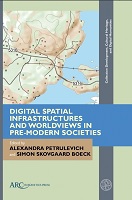Digital Spatial Infrastructures and Worldviews in Pre-Modern Societies
Contributor(s)
Petrulevich, Alexandra (editor)
Skovgaard Boeck, Simon (editor)
Language
EnglishAbstract
The study of medieval and early modern geographic space, literary cartography, and spatial thinking at a time of rapid digitization in the Humanities offers new ways to investigate spatial knowledge and world perceptions in pre-modern societies. Digitization of cultural heritage collections, open source databases, and interactive resources utilizing a rich variety of source materials—place names, early modern cadastral maps, medieval literature and art, Viking Age and medieval runic inscriptions—provides opportunities to re-think traditional lines of research on spatiality and worldviews, encourage innovation in methodology, and engage critically with digital outcomes.
In this book, Nordic scholars of philology, onomastics, history, geography, literary studies, and digital humanities examine multiple aspects of ten large- and small-scale digital spatial infrastructures from the early stages of development to the practical applications of digital tools for studying spatial thinking and knowledge in pre-modern sources and societies.
Keywords
spatial infrastructure;spatiality;Medieval Studies;place names;Linked Open Data;spatial humanities;Geographic information systems (GIS)DOI
10.17302/CDH-9781802700794ISBN
9781641894692, 9781802700800, 9781802700794Publisher
Arc Humanities PressPublisher website
https://arc-humanities.org/Publication date and place
2023Series
Collection Development, Cultural Heritage, and Digital Humanities - ARC,Classification
Museology and heritage studies
European history
Literary studies: ancient, classical and medieval


 Download
Download